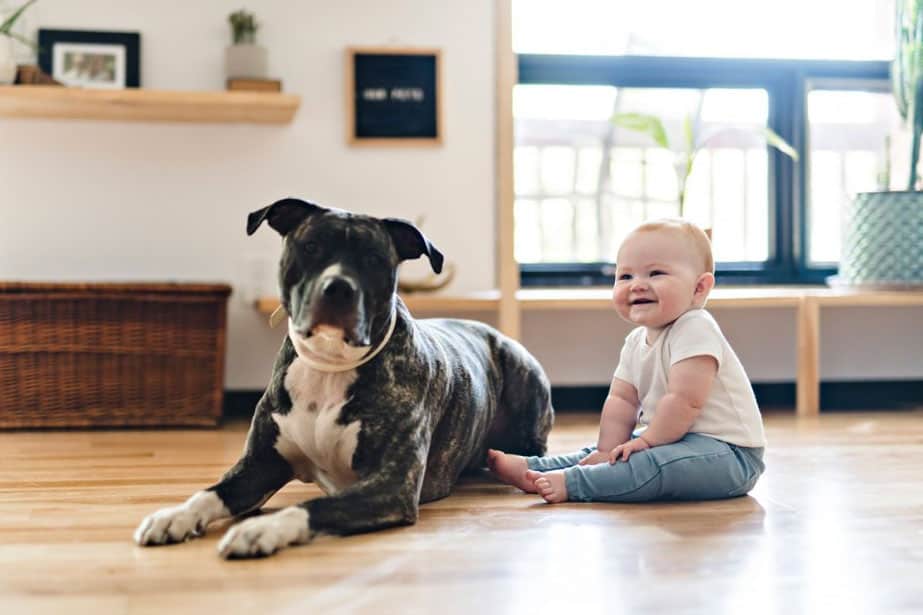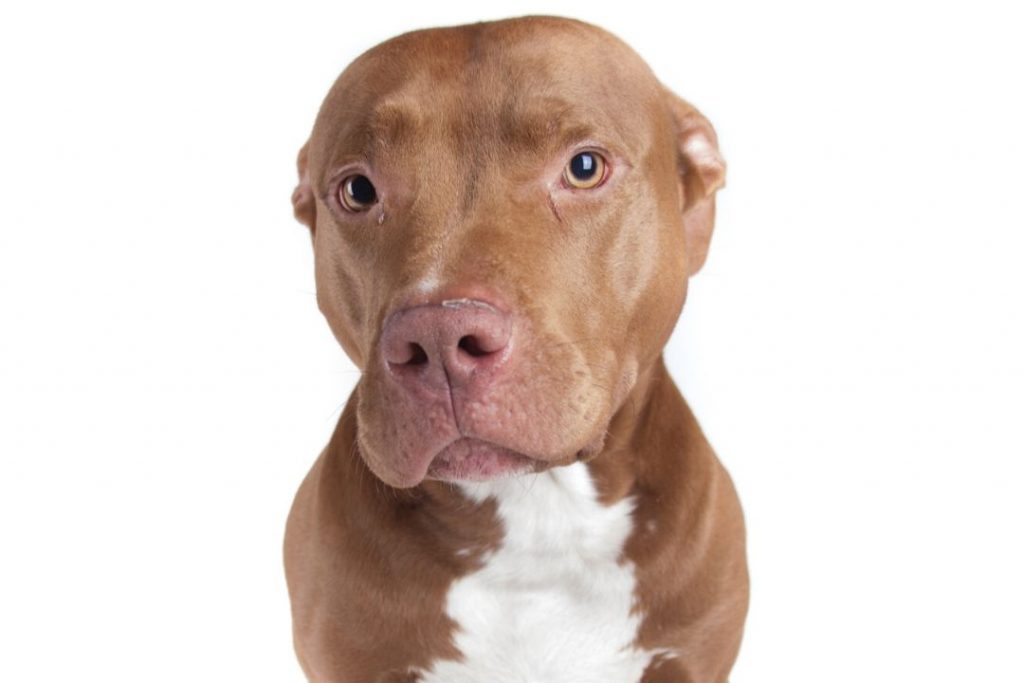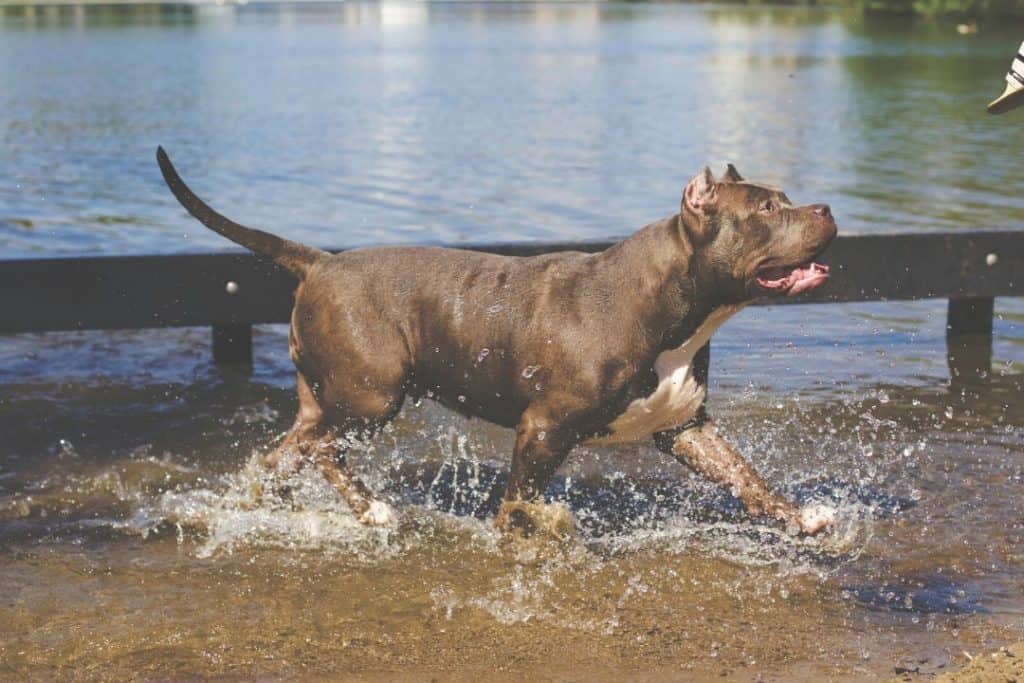This article may contain affiliate links, and I will be compensated if you make a purchase after clicking on my links (at no additional cost to you)
Most pit bull parents would consider their pups part of the family-their furry kids.
However, if the time comes when these parents want kids that are a little less hairy, they may wonder if their pit bull is the best roommate to have with their new baby. When it comes to the question are pit bulls good with babies? there are definitely two strong opinionated sides, so which side is right and which one is wrong?
When considering whether pit bulls are good with babies, it’s important to consider each dog as an individual instead of generalizing an entire breed. Most pit bulls are eager to please their humans, tiny ones or otherwise, while others may find babies loud and upsetting. Always introduce your pit bull to new people slowly and evaluate their response before giving them complete trust.
Let’s dive in and look at both sides of the argument in detail so that each family can decide for themselves whether pit bulls and babies are a winning combination.
Pit Bulls Can Be Great With Babies
Any quick Google search will reveal thousands of testimonials in favor of pit bulls and babies.
You’ll find pictures of babies sprawled on their pit bull playmate or drooling into soft, listening ears. You’ll even find some sites that refer to pit bulls as “nanny dogs.” These stories aren’t lies and these pictures aren’t fake, pit bulls can make great canine companions to babies (and adults) of all ages.
Even though pit bulls have a history of being bred for baiting and then dog fighting, they were never selected to be aggressive against humans. In fact, showing aggression towards their human handlers was found very negative and these dogs typically didn’t advance to a breeding age.
While dog fighting still has some popularity as an underground sport, these days most pit bulls are bred to be companion animals and they have succeeded very well in their new role.
The United Kennel Club describes the personality of pit bulls as “eager to please and brimming over with enthusiasm.” It goes on to say that pit bulls “make great family companions and have always been noted for their love of children.” This description wasn’t just made up, it had to come from experiences and observations of many, many pit bulls and babies.
A pit bull’s personality, or that of any dog for that matter, comes from a mix of their genetics and their environment. And it turns out that genetics don’t play as great of a role in personality development as was once thought.
This means that the way a dog is raised, trained, and treated will greatly affect their personality and how they react with the people and animals around them.
If a puppy is properly socialized, treated humanely, and adequately trained, they can be great with babies. Older dogs may be a little more difficult in the beginning, but following the same guidelines can make them trustworthy baby companions as well.
This is why it’s so important to evaluate each dog individually rather than grouping them under the potentially bad rap of a breed.
The Dog Bite Statistics
On the other side of the pit bulls and babies debate are those people that show you statistics of dog bites and children. It’s true that there are more than their fair share of pit bulls making up those numbers, but does that mean they are all blood thirsty attackers just waiting for the opportunity? First let’s check some of those statistics.
A 2018 Sarasota Herald-Tribune article by Laura Marusinec cites numerous medical studies of dog bites in children with a general consensus that pit bulls are responsible for the greatest percentage of dog bites and also the most damaging bites to kids.
DogsBite.org, a public information site, reports similar news, claiming that pit bulls account for about 2/3 of the fatal dog attacks in America. These numbers are hard to argue with, especially if you’re a parent looking to adopt a pit bull or bring a new baby into your already pit bull laden life.
What Dog Bite Number May Mean
For those of you that know a friendly, loving pit bull those dog bite statistics are probably hard to stomach, but it’s also hard to debate those numbers. However, it may be important to note that being categorized as a pit bull is an iffy at best classification.
The only true pit bull is an American pit bull terrier. That being said, at least two other breeds and multiple mixes constantly get thrown into the pit bull category.
Breeds like the American Staffordshire terrier, Staffordshire bull terrier, and sometimes anything with a broad head and short hair of a diverse background are commonly referred to pit bulls. This lack of differentiation may boost the bite numbers for pit bulls.
Another bit to note is that pit bulls previously had, and to some extent still maintain, a reputation for being mean, aggressive guard dogs. While their guarding ability may have been subpar, their general tough appearance gained them popularity with gangs and others looking to protect their property.
This popularity lead to an increase in the number of unsterilized, mistreated, tied to chains pit bulls in many communities. Again, personality is mainly a result of a dog’s environment and growing up like this is bound to create some hostility and aggression.
Can Pit Bulls Be Made to Be Safe Around Toddlers

If you’re already the proud parent of a pit bull then chances are you know just how eager to please you they are.
The same can be true if you have a baby. All of the things that you would do to make them great companions for you can work to do the same for babies. This goes for all breeds.
There isn’t a group of dogs out there where all members behave accordingly with babies.
- Socialization: This is the most important ingredient in creating a baby-friendly pit bull. They need exposure to all things baby in order for them to accept one into their life. Just like most of us don’t take kindly to being bombarded with no warning with new and difficult tasks at work, pit bulls will behave better if they have some idea of what to expect. Let them be around babies, toys, diapers, etc, in a controlled environment to gauge their reactions and let them interact at their own pace, don’t force it on them.
Babies are noisy, they smell funny, and they make a lot of sudden movements.
That can definitely overwhelm even the most chill pit bull, so be sure to let them take introductions at their own pace. Forcing a pit bull into an uncomfortable situation can lead to aggression from fear or anxiety.
- Training: Once your pit bull has experienced some baby activity, show them how to react properly. Praise them for being kind and gentle and show them the right behavior if they have troubles. Make sure they know some basic commands, such as sit or down, so they can revert to these devices if things get to be too much to handle.
- Exercise: Pit bulls are active pups. They need exercise, sometimes a lot of it. Without having an exercise outlet or mental stimulation, pit bulls can turn their energy into aggression. This goes for being around babies or adults. Keep your pit bull positive and happy with lots of walks, interactive toys, and one-on-one attention.
Are Pit Bulls Good With Babies?
Back to the original question, are pit bulls good with babies?
The answer comes down to each dog itself. With any breed of dog, there are going to be some that aren’t baby-friendly and some that are deemed baby-proof.
Which kind of pit bull you have will depend on how they were raised and trained. Some other important tips for ensuring babies will be safe will a pit bull are as follows.
- Supervise: This goes with any dog at any time. Always supervise when dogs and babies are together. Even dogs that have never raised a lip at a baby and have allowed any and all hairpulling and tail tugging have a threshold. Fortunately, when babies are young, there doesn’t need to be a lot of interaction with your pit bull. Most babies don’t spend a lot of time on the floor or within a dog’s reach. However, as they get older, babies will start to test boundaries more and that’s where you need to step in.
- Train your children: Like a young puppy, babies are exploring their world and what’s socially accepted. They may experiment by kicking, hitting, or otherwise tormenting any dog just to see what happens and because they don’t know any better. It doesn’t take much of this kind of treatment to have any dog on the defensive. Teach your baby at a young age proper etiquette for handling animals, just as you would teach puppies how to sit and stay.
- Give your dog a safe space: Have an area that is dog-only and off limits to your baby. Maybe that’s their bed or a snuggly hidey-hole. Let your pit bull escape there when they’re overwhelmed with the little one, or allow them to store their stuff there so that baby doesn’t claim everything as their own.
Conclusion
There are many pit bull horror stories out there, especially related to children.
There are also many heartwarming pit bull-baby relationships.
That kind of relationship that your family will have with a pit bull will depend on that specific dog.
Put time in to socialize and train your pit bull and to teach your babies how to positively interact with them as well.
Also, be sure to make introductions slow and stress-free so that both parties are able to find comfort in their new companions.

Dr. Chyrle Bonk has been a veterinarian since 2010. When she’s not practicing medicine or writing, she’s spending time with her family in the great outdoors of Idaho or tending to her menagerie of animals.




We purchased a pit bull from a breeder and knew the pup since her birth. We had dogs all of our lives and had dogs ever since my children were babies. This pit came into our family when my kids were 3 and 7 and was receiving training early on from the breeder. One day while I was home with my kids but went out to clean up our yard, I heard a blood curdling scream from my kids and rushed in to find them both locked in the bathroom after our pup turned on my 7 year old ( who loves all creatures big and small) while he was playing with our pit and left a bloody teeth soaked bite on his arm. We kept the dog locked up for a week and then returned her to the breeder realizing I would not be able to trust her 100% with my kids from hereon. She was replaced with a kind and gentle Shepherd.
My grandaughter just had a baby she has a 5 year old pittie who is very good around people but has never been around children. We are very concered about this, Simba is her other baby and she loves this dog. He has never had any real training. He sits, is not food aggressive, but does jump on you and very playful. We need to get a trainer who knows this breed of dog. We live in Arizona and thought that maybe you could help us out with someone.
I have a pit bull had him since 6 weeks he’s a sweetheart we have 5 kids he has never shown any aggression at all. He’s almost a year old & today I was putting out some food for him my toddler was with me and he growled and snapped his arm he didn’t hurt him like make him bleed but he definitely nipped him. Now my Heart is broken idk what to do. Someone help he has never had food aggression idk if I give him away or what
Your loved dog is indicating how important his territory is to him.
You must remember children have no understanding of being territorial.
It must best to turn the dog over to dog facilities.
Stay positive for a new pet as your child s ages.
I’m a new grandma, and the baby hasn’t come home yet. I’m already worried about my daughter and son-in-law’s pit bull. I think they will be too lenient with the dog. The dog once attacked my little dogs and drew blood. It’s been over a year since that happened. It scares me to think about their dog attacking the baby. How do I talk about this with them. They will think I just don’t have enough faith. I’m practical. My faith doesn’t allow me to just trust God in this. Bad things do happen, even when we pray. It’s difficult for me to trust the dog around a child. I just don’t know. She’s a loving dog, but also a jealous one.
My dogs know I love them but they have to behave. But their nature is also unbelievably protective and loving. Every so often I play fight with momma/grandma hard. She fights back appropriately rough but the instant I say where’s my kiss she stops and starts kissing me like crazy. She understands that being hurt isn’t dangerous from family. She also is the last one you’d ever want to hurt a kid in front of. Know you dogs but more importantly let them know you. You can see in your dog and in the videos online that some dogs, mostly pitties have an infinite amount of patience with little pink humans.
My husband just got a pitbull puppy, I checked the teeth first and the pup is more likely pure pitbull. I’m just worried that as the puppy grows he will not know how to control his aggression and we also have a mixed female lab. I plan on getting him nuetered but I just have a real bad feeling about this pup, I’m educating myself on how to raise a good pitbull around kids, I’ve read so many horror articles about kids dying from putbulls, and it breaks my heart, but I just have a gut feeling something bad may happen to my toddler, I just don’t how to get past it, regardless the pup is staying but I just don’t like the idea of taking a chance 🙁
I had my pit since she was a newborn and I bottle fed her. She is now over a year old. I am a Vet and I also am bonded well with the dog. However I have kids and I dont trust her (my pit). I just dont trust her at all around my toddler. I never ever had a problem with a German Shepherd, EVER. But this pit, even though I bottle fed her and she is a sweet heart……..It is a pure gamble. I will give her away to a farm where she will cattle ranch. You can see her looking at the Toddler running around at times and the look in her eye is very cold and scary. I will go back to the German Shepherd breed, they were never like her, they just know how to behave around kids and are sweet hearts and much more intelligent, and have better hearing, better eyesight, better sense of smell, and better “manners”, and are thoughtful, not greedy and rough.